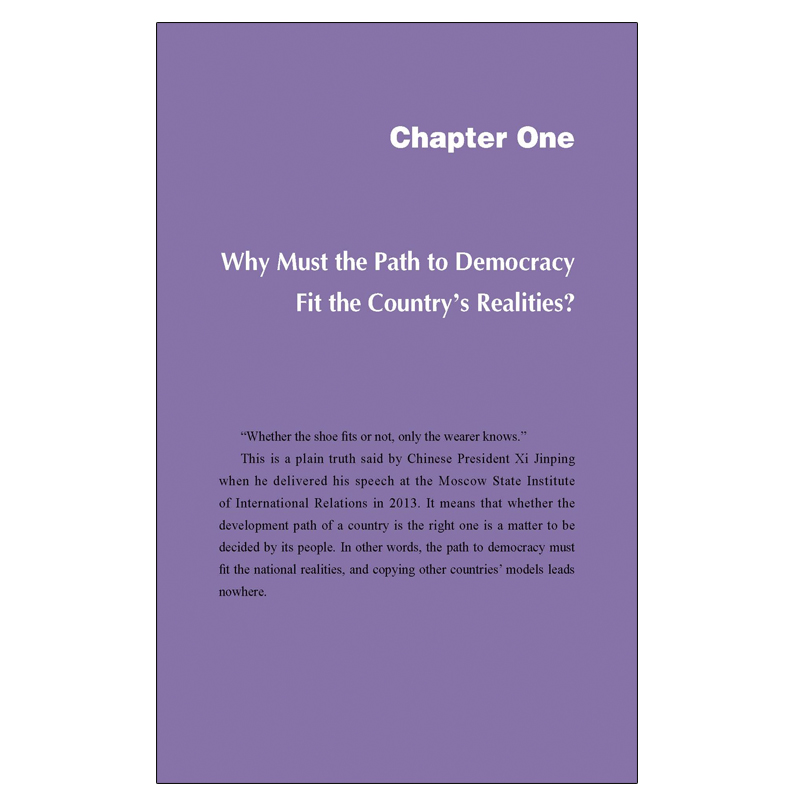
出版社: 五洲传播
原售价: 139.00
折扣价: 83.40
折扣购买: 中国读本丛书-民主是个好东西:中国民主是怎样的民主(英)
ISBN: 9787508546674

陈坚:现任中央党史和文献研究院研究员,先后发表《从新时期党代会报告看中共民主观的演变》《执政党党内民主与构建社会主义和谐社会》《改革开放以来我国政府机构改革历程述略》《党的代表大会由年会制到常任制的演变及其试点模式》《党的群众路线形成与发展》《改革开放与党的自我革命》等100余篇文章;出版《中国民主政治的走向》《民主监督——中国共产党理论与实践》、《群众路线与党内教育活动》《人民至上》《毛泽东的1949》《当代中国政治》《自我革命:中国改革开放成功的政治密码》等10余部著作。
China, a major country with over 5000 years of civilization, has made significant contributions to human development and progress. In the 19th century, China saw a decline in its agricultural civilization and its system of feudal autocracy that had lasted for thousands of years had ossified, so the development of Chinese society was at a standstill. Although China then was still a “big oriental country” and the richest in the world, crisis lurked in all corners at the time. The Qing Dynasty (1644-1911) that was ruling China was politically corrupt. Its armaments were abolished, and finances were tight. During the same period, some European and American countries established advanced social systems and modes of production through bourgeois and industrial revolutions. In order to grab greater benefits, Western powers turned their attention towards the rest of the world for crazy overseas expansion and colonial plunder. China, with its vast territory and abundant resources, naturally became their coveted target. In 1840, the British colonists opened the closed gate of the Qing Empire with their powerful ships and guns and dumped opium on a large scale. The First Opium War (1840-42) broke out. In August 1842, the defeated Qing government was forced to sign the first unequal treaty of national betrayal and humiliation with the British government. As more Western powers intruded in, the Qing government was forced to sign one unequal treaty after another, which severely damaged China’s sovereignty and territorial integrity. According to incomplete statistics, more than 400 unequal treaties were signed by the Qing government with foreign powers in modern times. Invaded by external imperialism and oppressed by internal feudal despotism, the Chinese nation plunged into danger, and its people had no democratic rights at all. Generations of Chinese people rose up and fought courageously and unyieldingly in order to change the destiny of the country and the nation. During the National Salvation Movement, some advanced Chinese, who turned to the West for finding a way to save the country and the people, once promoted the bourgeois reform movement and launched the bourgeois-democratic revolution in China. Facing the old China with internal disturbance and foreign aggression, the Chinese people had gradually formed a consensus: To save the country, China must reform; to reform, China must learn from progressive countries. At that time, only Western capitalist countries were progressive because they had successfully built themselves into bourgeois countries. Another important reason for choosing to learn from the West was that Japan had become a powerful country through the Meiji Restoration. The success of the Japanese in learning from the West inspired the enthusiasm of the Chinese to learn from the West. Under such historical conditions, the reform ideas of the bourgeoisie spread rapidly, which gradually formed an ideological trend of reform, and developed into a political movement of the Hundred Days Reform. “中国读本”丛书,以让世界更好地读懂中国为出发点,重点向国外读者介绍中国道路、中国理论、中国制度和中国实践。


